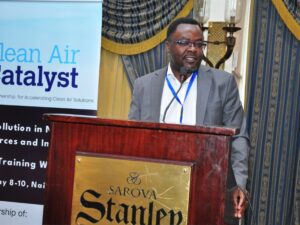By Lenah Bosibori
Nairobi, Kenya: Amidst the rapid urbanization and daily routines in the vibrant city of Nairobi characterized by its energy, there exists a hidden enemy that silently poses a threat to the well-being of its residents, air pollution.
The city has unfortunately been grappling with the consequences of air pollution. As vehicles fill the streets and industrial activities release pollutants into the atmosphere, the air quality suffers, with elevated levels of harmful particulate matter that are very tiny interfering with the respiratory system according to experts.
During a recent media workshop on Air pollution in Nairobi organized by Internews, Sammy Simiyu, a Public Health Specialist at Nairobi Metropolitan Services and a representative from Vital Strategies, encouraged Nairobi, residents, to jog at lunch hour or at night when emissions are at their lowest.

“People have a tendency of jogging in the morning and in the evening when there is a lot of traffic and emissions, encouraging them to instead jog during the lunch hour or at night when there are no emissions, ” said Simiyu.
He highlighted that early mornings often coincide with peak hours of air pollution when traffic is so high, as emissions and industrial activities start to gain momentum. These activities contribute significantly to the concentration of harmful pollutants in the air, posing a considerable risk to respiratory health.
A report by the State of Global Air /2019 also indicates that air pollution is the fifth leading risk factor for mortality worldwide. It is responsible for more deaths than many better-known risk factors such as malnutrition, alcohol use, and physical inactivity. Each year, more people die from air pollution–related disease than from road traffic injuries or malaria. State of Global Air 2019.
Simiyu’s recommendations are not merely for individual benefit but also contribute to the collective effort of combating air pollution in Nairobi. By making this adjustment in jogging routines, residents can actively participate in reducing their exposure to harmful pollutants while striving for a healthier, more sustainable city.
The expert’s message is not one of restriction or limitation but rather an invitation to make a simple adjustment for the sake of our well-being. They acknowledge the allure of early-morning workouts, with the cool air and sense of accomplishment setting the tone for the day. However, they assert that by shifting our jogging routine to the daytime, we can still enjoy the myriad benefits of exercise while minimizing our exposure to harmful pollutants.
He added that air pollution is a global thing that affects all stages of life and all other body organs leading to loss of lives.
“Kenya loses 27,500 people yearly due to Air pollution; it also reduces life expectancy in Kenya by 1.6 years, there are 124 deaths per 100,000 due to air pollution higher than the global average that is 86 deaths per 100,000, 14 percent are in children under five and 14 percent are in adults over 70 years,” read Simiyu’s presentation
Impacts of air pollution at different life stages
During his presentation, Simiyu emphasized that air pollution has persistent effects on all stages of life. He highlighted the following impacts:
Prenatal: Simiyu stated that exposure to air pollution during pregnancy can lead to reduced fetal growth and development.
Birth: He noted that air pollution is associated with an increased risk of preterm birth and low birth weight, which can have long-term health implications for infants.
Childhood: Simiyu highlighted several adverse effects on children, including decreased lung growth, reduced lung function, and a higher susceptibility to lower respiratory infections such as pneumonia. He also mentioned potential developmental effects linked to air pollution exposure
Life Long impacts: chronic respiratory and cardiovascular disease
Simiyu’s presentation emphasized the wide-ranging and significant health consequences of air pollution at various stages of life, underscoring the urgent need for effective measures to mitigate its impact.
Dr George Mwaniki, head of Air Quality World Resources Institute (WRI) Africa said that lifestyle diseases kill more people than communicable diseases.
“Lifestyle diseases in Kenya are killing more people than communicable diseases because of air pollution,” said Mwaniki.
He reinterred that road transport will remain a major source of air pollution in African cities as its effects impact life later.
“If you are breathing bad air, the effects and problems will be seen later,” said Mwaniki.

In this challenging backdrop, the expert emerges as a champion of public health and an advocate for a healthier Nairobi. With a wealth of knowledge and a genuine concern for the well-being of the city’s inhabitants, they shed light on the importance of timing our physical activities to mitigate the risks associated with air pollution.














